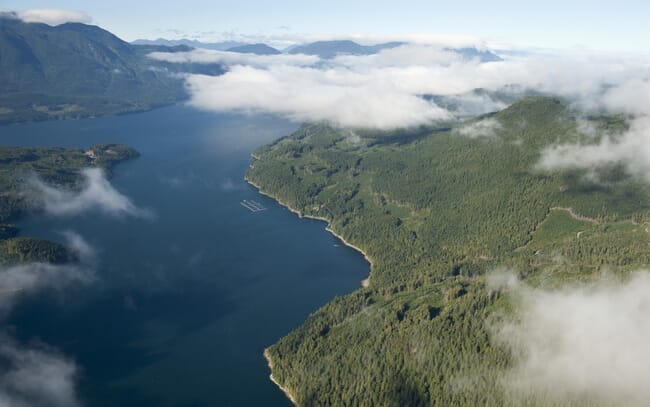
The Canadian government aims to close down open net pen farms in the province by 2025 © BCSFA
The report, called BC Salmon Aquaculture Transition: Then & Now, also outlines how the sector’s deep history of innovation supports the federal government’s vision for BC aquaculture, reconciliation, food security, the blue economy and climate friendly protein production.
In July 2022, the Department of Fisheries and Oceans Canada (DFO) released a framework for discussion regarding the net pen transition plan for BC. The proposal for transition of the salmon farming sector to be First Nations-led is taking place concurrently, with DFO’s development of a new framework.
“Working together with First Nations who are interested in aquaculture is essential to our future on the west coast,” said Diane Morrison, board chair of the BC Salmon Farmers Association (BCSFA) and managing director of Mowi Canada West, in a press release. “These principles will ensure we transition in a way that progressively minimises interactions with wild salmon and be led by the First Nations in whose territories we operate.”
To be compatible with the sector’s vision for salmon farming within the territories of First Nations, the BCSFA suggests the following fundamental principles be included:
First Nations right to self-determination: The Transition Plan must fully recognise and support Indigenous rights to self-determination and the rights of First Nations to make informed decisions on matters that impact their territories.
- Reconciliation: The Transition Plan must ensure continued opportunity for capacity building within Nations and equitable economic opportunities – as well as establish a framework for enduring long-term relationships.
- Governance: The Transition Plan must include a governance model based upon tripartite agreement (First Nations, federal, and provincial governments) – and provide a robust role in governance and oversight for Indigenous rights holders in whose territories the salmon farms operate.
- Sustainable sector growth: The Transition Plan must support the creation of an attractive business environment that signals Canada is committed to advancing growth in sustainable salmon farming in coastal BC. A transition growth plan that builds towards increasing production volumes.
- Alignment with federal initiatives: The Transition Plan must support investment into innovative practices and technology, and other federal government priorities, especially the Climate Change Plan and Blue Economy Strategy.
- Trust and Transparency: The Transition Plan must provide clear communication processes and outlets, including engagement opportunities, that will help to foster a better understanding of the industry and create trust and transparency with local First Nations who have aquaculture within their territories, as well as First Nations who have an interest, and the broader Canadian public.
By working through these principles, the Transition Plan has the potential to create a level of business certainty required for the long-term stability of the BC salmon farming sector and allow the sector to play an even greater role in the ongoing process of reconciliation in BC, community vitality, and the restoration of wild salmon.
“Transition is not new to our sector,” says Brian Kingzett, executive director of the BCSFA. “Like all farmers, we have been transitioning for decades to adapt to changing conditions. We have been investing in and implementing cutting-edge technologies and innovations to improve our processes, and progressively minimise interactions with the surrounding marine environment, including wild salmon.”
The BCSFA also argues that the Transition Plan could expand the sector’s capacity to contribute to the success of Canada’s Blue Economy Strategy by generating the magnitude of economic benefits, jobs, investment and regional growth that will help to advance BC’s economy on a low-carbon, environmentally sustainable, climate-resilient and competitive path.




